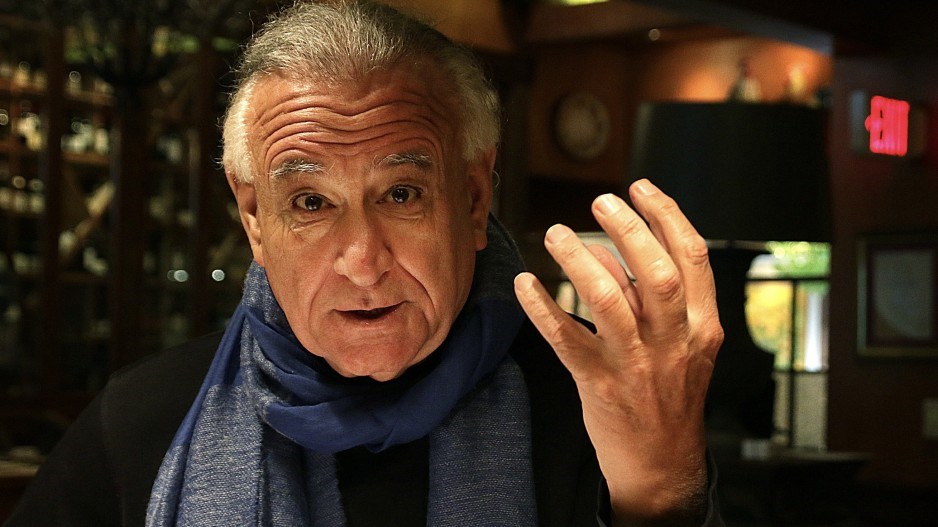What happened: Longtime restaurateur Umberto Menghi was one of the first Vancouver restaurant owners to close his business as the threat rose from COVID-19. He shared some personal thoughts on what he is going through and how he feels.
Why this matters: The unexpected and sudden restrictions on restaurants and other tourism businesses are rattling owners and creating an emotional toll as well as a financial one.
The longtime restaurateur, and Giardino owner, cut short his vacation in Hawaii when cases related to the pandemic started to spread in North America.
“I was thinking about Giardino, my staff, the customers and all this that we’re talking about – confusion,” the 73-year-old said. “So I said, ‘Why don’t I go back and shut it down?’”
Giardino's March 14 closure was originally intended to be for a month but the rapid spread of the virus and the B.C.-wide shutdown on restaurants operating for anything but take-out and delivery have left him unsure when he would be able to reopen.
He told employees before he closed that he would cover two weeks’ worth of pay. The federal government then changed employment insurance eligibility to allow workers to get compensation without any wait. The reality, however, is that many workers will in the coming months be bringing home much less than they usually do and some could be in dire straits.
Menghi's small high-end restaurant buys many ingredients daily and others frequently to ensure that they are fresh, so he did not have a lot of food that would go to waste. Suppliers took back some of the food and Menghi said that he took some home to make meals for himself and his wife.
He spent many days during last week’s sunny weather gardening at home and reflecting on the state of the world.
“It’s like wartime,” he said. “This is a problem for everyone – rich, poor, whatever religion. This is the first time in my life that I’ve lost the feeling of a sense of belonging where I am. I’m like a fish out of water.”
Fortunately for Menghi, he owns the property under his restaurant so he does not have a landlord asking for lease payments.
Many restaurant owners are not as fortunate, with some telling Business in Vancouver that most peers could go under within a few months without a bailout by government.
Ron Toigo, who owns the White Spot and Triple O's chain, told BIV he was waiving royalty fees that franchisees would otherwise have to pay on sales. He was also on a case-by-case basis waiving lease payments that some franchisees would have had to pay on corporately leased premises.
Restaurants Canada data from 2018 showed that the restaurant industry generated $14 billion in annual sales and was worth 5% of the province’s GDP. The sector’s 180,100 employees represent 7.3% of the province’s workforce.
Tourists are estimated to account for 20% of restaurant spending, and their impact on the economy is even more substantial.
According to Destination British Columbia data, 137,800 people are employed in the tourism sector, which generates $18.4 billion in annual revenue.
Canada’s unprecedented ban on tourist visits therefore carries an enormous economic price tag and causes uncertainty for many even as it slows the progression of COVID-19.
“Destination British Columbia has ceased all marketing, including to the U.S. and Canada, and is focused on supporting industry and keeping them informed on the latest developments,” the province’s destination marketing organization told BIV in a statement.
It created a COVID-19 resource page that includes federal and provincial information on infection prevention, travel advisories and other information.
U.S. Treasury Secretary Steven Mnuchin called the COVID-19 crisis “worse than 9/11 for the airline industry – they’re almost ground to a halt.”
Vancouver Airport Authority CEO Craig Richmond concurred, calling the COVID-19 economic impact “more broad and deep than 9-11” because planes were back in the sky within five days of the attacks.
“We’re in unprecedented times,” he said. “I have been through a lot – 9/11, SARS, all kinds of airline bankruptcies, and near bankruptcies, and consolidations – and nothing has ever been like this.”
Restaurant blogger and analyst Richard Wolak said what makes the current situation different from 9/11, and even the global financial crisis of 2009, is that social media has become so prevalent. While that avenue of communication can be helpful, he said, it can also provoke anxiety because misinformation is rife.
When Vancouver Coastal Health ordered all bars and restaurants to close on March 17 except for takeout or delivery orders, several restaurant owners who spoke with Wolak had incorrectly heard that all the restaurants in Canada were supposed to close indefinitely.
A Conference Board of Canada report in May 2003 found that Canada’s tourism sector was walloped hard by fear of the SARS virus.
It suggested that Toronto suffered a $950 million (0.5%) hit to real gross domestic product and that $570 million of that decline was concentrated in the travel and tourism sector.
With COVID-19 long surpassing SARS in terms of cases, deaths and panic, the economic impact is so far incalculable. •




